#Noble Hierarch
Text

Noble Hierarch (Borderless Ver) by Greg Staples
#Magic the Gathering#MtG#MtG2XM#Double Masters#Noble Hierarch#Borderless Version#Fantasy#Art#Greg Staples#Wizards of the Coast
15 notes
·
View notes
Text

Here’s our MTGinktober for “Nest,“ starring Prime Speaker Vannifar and Kiki-Jiki Mirror Breaker! Combo like it's going out of style.
Click this post’s Source link for this piece’s Making-Of.
More MTGinktober here.
Daily art updates on Instagram and Twitter.
Reuxben
#Reuxben#MTGinktober#Inktober#Magic: The Gathering#Prime Speaker Vannifar#Kiki-Jiki Mirror Breaker#Restoration Angel#Scryb Ranger#Bounding Krasis#Birds of Paradise#Noble Hierarch#Inktober 2022#Traditional Art#Black and White#MTG Fan Art#Ravnica#Conflux#Kamigawa#Algen#Animals#Angel#Goblins
51 notes
·
View notes
Text


Noble Hierarch // Ignoble Hierarch
0 notes
Text
World Map Notes: the Elven Northern & Southern Central Continents
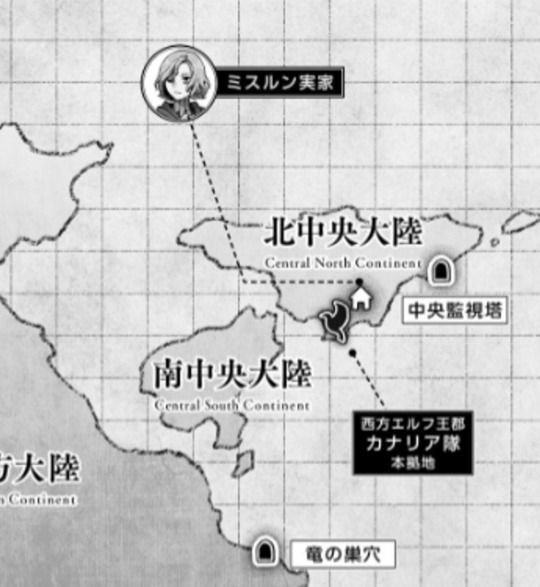
These nations are where all the elves in the story except Marcille and Thistle are from. This post collects all the information I could find about these two nations, and included a bit of analysis based on that information.
TL;DR (includes both fact and my speculation):
The Northern Central Continent is a feudal monarchy with a strong class system, as well as strict borders, & could probably be considered an ethnostate. It's deeply hierarchical, and the queen is a traditionalist - so it's probably very structurally biased against non-elves and half-elves.
Elves in the NCC practice cannibalism in some rural areas!
The Southern Central Continent is more diverse, with a large tallman population on its South Coast.
To elves, "Court Magicians" exclusively refer to those serving the elven queen - a prestigious role that seems likely to be only open to nobles.
The SCC may not be a monarchy, though it's not clear what kind of leadership or societal structure it does have.
The NCC will habitually take anyone involved in ancient magic as a criminal to prosecute on their terms, regardless of jurisdiction, but this depends on their political influence and ability to pressure local leaders to agree to extradite the criminal.
Elves VS Dwarves and Gnomes may have been at war around the time of the Golden Kingdom being sealed. This conflict also may be one of the factors pushing the kingdom to be sealed in the first place.
The "Central Region" might be the origin of the "Common Tongue" that our characters speak.
Northern Central Continent
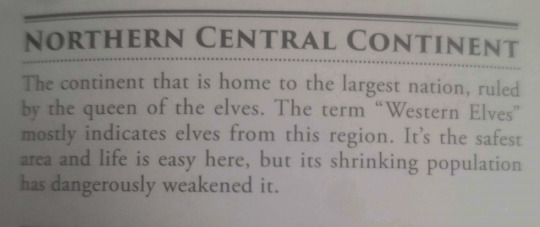
The Adventurer's Bible | p. 132
For this place to have a high quality of life, and also a declining population - especially when it's so close to the Western Continent, which is stated to have poor quality of life - there must be strictly maintained borders and a strong anti-immigration policy. Based on the attitude of the elves, I wouldn't be surprised if it was very difficult to move there unless you are also an elf.
It could probably be considered an ethnostate - and while in these kinds of fantasy worlds, that's pretty common. Take Rivendell, or Moria, in LOTR - they take for granted that these kinds of different fantasy races will live in separate communities.
But that isn't actually realistic, and I think Kui has considered it as more of a politically established status quo rather than an obvious natural result of having magically distinct "races". Which, even in Dunmeshi, I think is a difficult and not-terribly-accurate way to represent politics - racism does not emerge from actual, physical differences between races, after all.
But Dunmeshi's presentation of this idea is interesting, because of the recognition that if there is an "elven nation" which prioritises the interests and rights of elves over other races, that is because there's a deliberate, concerted effort to keep it that way.
But there's a small section of the NCC with a high tallman population - I wonder what kind of community they have, and how they fit into the strict elven hierarchy?
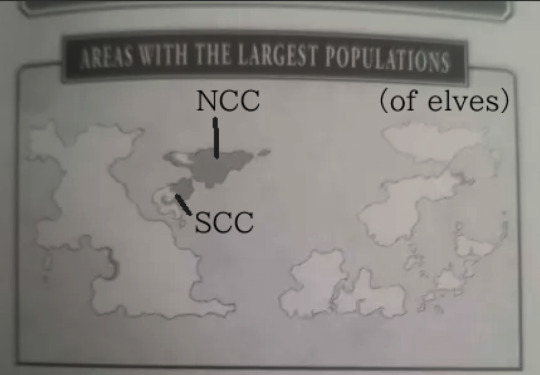

The Adventurer's Bible | pp. 134 & 136
Kabru and Rin, and other kids like them, who are adopted or taken as adopted children(rarely - the way Milsiril treats Kabru is not perfect, but she's deliberately attempting to be better than other elves.... meaning other elves are usually worse)/pets/objects by elven nobles, as well as accomplished or notable individuals who earn the elves' favour/are "invited" to stay (such as they try with Laios at the end of the story) would be an exception.
Other long-lived races could probably (...?) visit, but given the historical conflict between elves, dwarves, and gnomes, I think they'd also be pretty hostile to many of them coming to live on the NCC, even if they see them as more like equals.
Social Structure & Nobility
The Northern Central Continent is an absolute monarchy under a 372 year old queen, Heimeya (IDK what the official romanisation of her name will be).
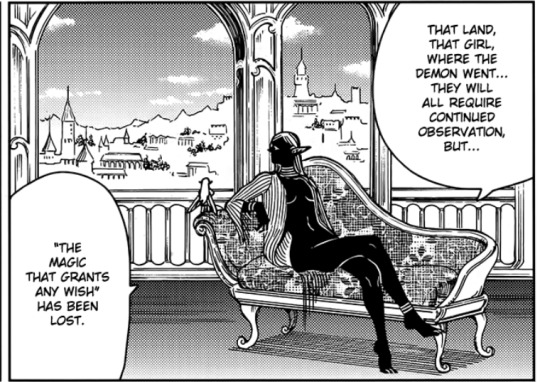
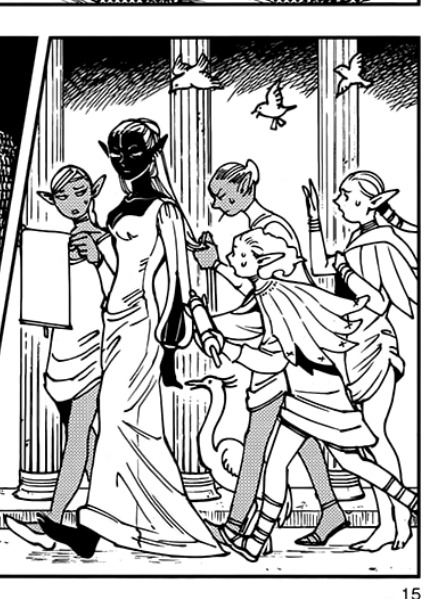
...With extended "nobility", which are the group that the canaries' guards draw from. We don't get much clarification of what sort of structure their nobility has, what titles there are, and where our characters who are nobles fall into it.
Pattadol (House of Vari), Mithrun (House of Kerensil), and Milsiril (House of Tol) are nobles.
Mithrun's noble house, Kerensil, is apparently a well-known family of investors! I wonder what sorts of businesses they invest in & what the elven economy is like?
Milsiril's house, on the other hand, is a well-known military family. I wonder if Kabru could claim the surname "of the House of Tol". He did go to family gatherings after all. But if he was comfortable doing so and it would be accepted, I would assume he'd have done so when introducing himself to the canaries.
Flamela is a distant relative of the queen, who has additional status due to exhibiting the genetic trait associated with their queens, extremely dark skin.
The queen is a "staunch traditionalist" who wouldn't even acknowledge a half-elf like Marcille. Nice! I really feel bad for Kabru and Rin growing up as tallmen in this sort of culture.
Court Magicians
While generally this is a term for any magic user who serves in a royal court, in the Northern Central Continent it seems to carry a lot of esteem; even just as the daughter of one, Pattadol assumes Marcille has the right to boss her around and to handle highly secret, highly illegal ancient magic secrets.
That makes sense, as in the society of the Northern Central Continent, you'd be directly serving the elven queen. But also, she has enough Court Magicians that Pattadol would not expect to know Marcille's mother's name, but few enough that it would be a big deal and Cithis would know about it if one had a half-elf child.
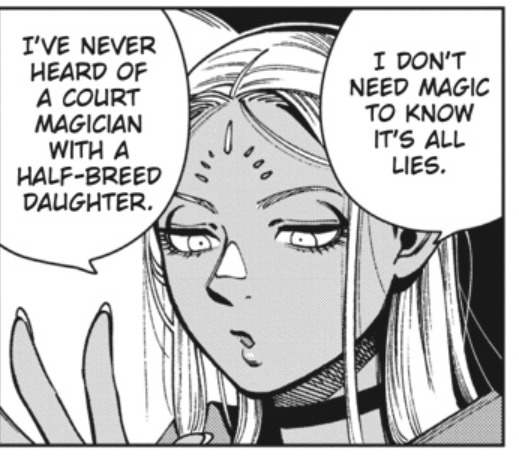
I don't think it's remotely unlikely based on that to assume that this role is only available to nobles.
A "Court Magician" who doesn't serve the NCC Queen isn't a "real" Court Magician in the eyes of NCC elves. Those short-lived monarchs would be happy just to have an elf around regardless of whether they were actually any good at magic.... according to Cithis.
Magic seems very important to the society of the NCC elves. The queen communicates with her subordinates via familar, and the birds we see surrounding her seem like they are some kind of magic - perhaps not familiars since we see her familiar, but some other kind of scrying?
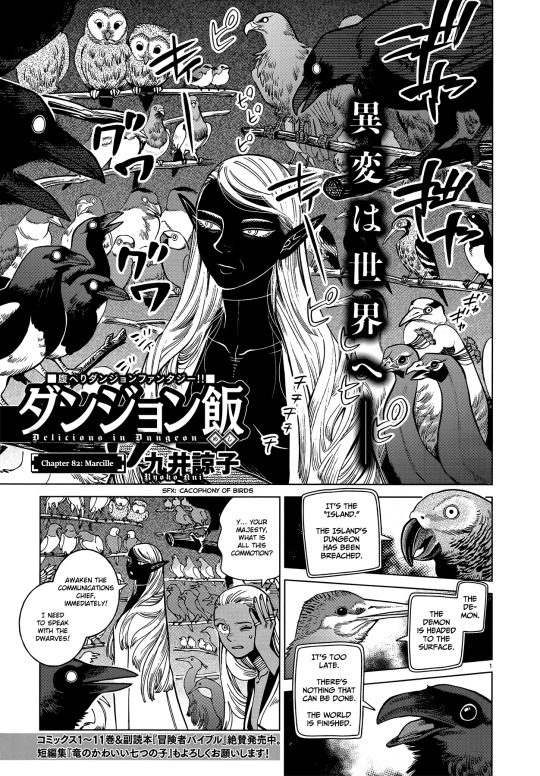
Also, based on the fact Pattadol assumes a Court Magician would be serving the Queen of the NCC, we can theorise that perhaps whatever structure the SCC has, it isn't a monarchy....? Heimeya is "the queen of the elves", after all - that doesn't sound like there's another elven monarch competing for the title just next door.
Ordinary People
Apparently the NCC is a safe place and life is easy -- but given the strict class system, I kind of expect that varies a lot depending on the family you're born into.
The only elves we meet who are not nobles are the convicted criminal canaries, so it's hard to get a sense of what life is like for them from that. Cithis was apparently a wealthy fortune teller with "an intense jealousy for those born noble or wealthy." So I assume she was not born into comfort.
Apparently "There are also primitive villages deep in the woods and underground, and in some regions cannibalism is still practiced." Which is awesome. Based on her videogame elves art I think Kui's probably making a little nod to Divinity: Original Sin elves, who can absorb memories through eating the flesh of others. Elves in dungeon meshi don't have this trait, but I wonder if there is a magical ritual or some kind of cultural practice with a similar intention.
Cuisine
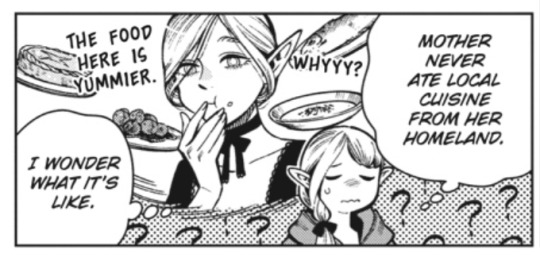
Marcille's mother didn't think much of the elven cuisine.
Liricmumwarel is fancy candy given out by the elven queen the shape of which conveys blessings.
Elf Cake is a crumbly dry cake that Kabru and Thistle don't think much of. I've heard someone discuss what it's likely to be made of, but I am afraid I don't recall.
Southern Central Continent
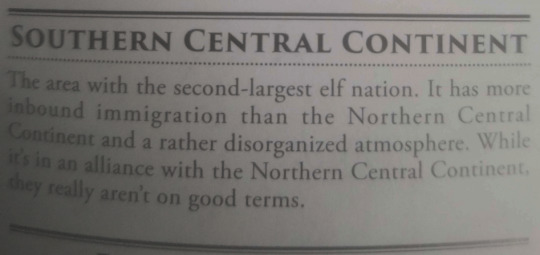
The Adventurer's Bible | p. 132
It seems like the Southern Central Continent gets a lot more immigration and has a more diverse population, especially along the south coast (near the Western Continent). That south coast has a high tallman population.
Fleki and Lycion are from the Southern Central Continent. Fleki got into ancient magic for the money, so you can assume there's probably class disparity there too; things are noted by Kui to be more "disorganised" than the NCC. Not a bad thing at all - the NCC is definitely too "organised" in my books. But that does potentially also mean there's less, e.g., bureaucracy, central organisation, less of a social safety net. But then again, in the NCC I doubt that whatever "safety net" there is, is available to everyone.
We can't extrapolate much from Fleki & Lycion's personalities, because they clearly aren't in the most stable societal position, and I get the sense that they're the countercultural type - they probably don't represent the type of person typical to the SCC. Also, our NCC characters are all either nobles or used to navigating high society (Cithis, Kabru to an extent) so they aren't exactly a typical "ordinary NCC person" as a basis for comparison either. However, there's less of a "strict set of social rules" type of feel to the SCC characters, fitting with my suggestion that the SCC may not be a society with a strong feudal element.
Geopolitics & Conflict
The fact that, despite their being from the SCC, Fleki and Lycion are in the Canaries, who work directly under the NCC's Queen, implies that the the NCC feel entitled to process and prosecute people who commit ancient magic-related crimes regardless of any notion of "jurisdiction". This is backed up by the way that they were going to take Marcille - but that is something that the governor of the Island had to give permission for, which Laios is able to withdraw. So I assume that the NCC elves apply pressure on various world leaders to extradite criminals involved in ancient magic.
The SCC would cooperate with this, since they're allies, even if they don't have a great relationship (according to the World Guide).
The NCC are also clearly able to take half-foots without trouble, as we see by Chilchuck saying he's known half-foots who got involved with "black magic" (ancient magic) and were disappeared by the elves. But I doubt gnomes or dwarves are giving people up easily - though that probably doesn't go for dwarves like Senshi and Namari, without strong community ties.
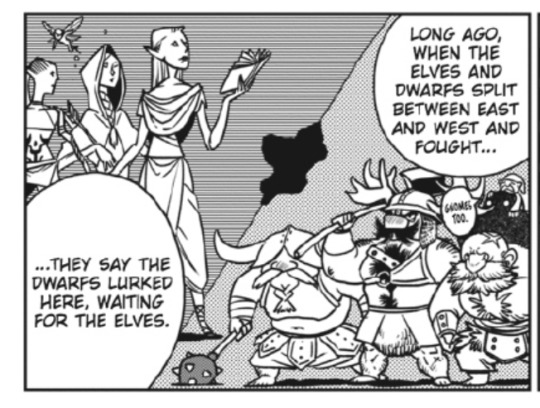
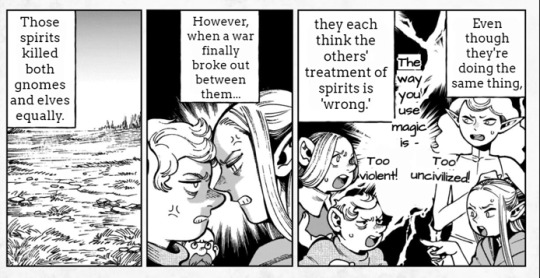
Long before the current times, elves fought dwarves & gnomes. There might have been more than one of these conflicts...? While long ago, this war isn't "ancient" (like the ancients who sealed the demon into dungeons, before their world was mostly destroyed by it).
Thistle, Delgal, and the Golden Kingdom were (I believe) caught up in one of these conflicts, which used Melini as a staging ground - thus why Thistle was pushed to seal the entire kingdom in the dungeon.
To do this, Thistle unseals a dungeon created by the "ancient people". These could be the "ancients" who created the dungeons, before the apocalypse. Or they could be another, still extinct, society.
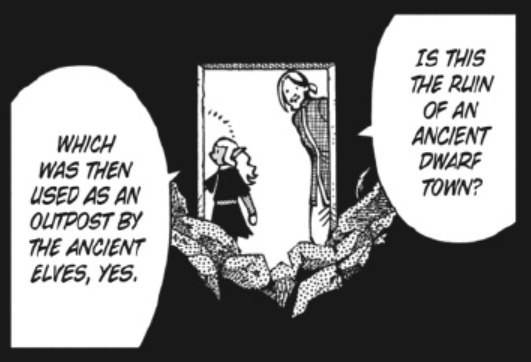
Regardless, at least one of these conflicts seems to have taken place after the golden kingdom was sealed - so, within the last 1000 years.
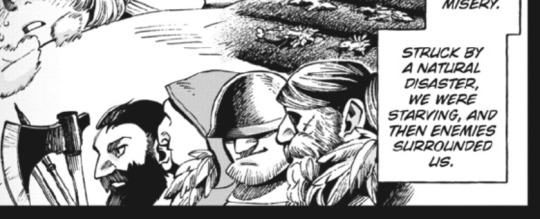
Though, this could refer to a different, more localised conflict between the Golden Kingdom and their dwarven neighbours.
The order of events is that the Golden Kingdom was sealed (1000 years ago or so) > Dwarves took over > Elves stole the land from the Dwarves ("long ago" by the Island Lord, a tallman's, standards) > Elves gave the land to a local lord, who was either an ancestor of the Island Lord, or the Island Lord himself. The Island Lord is himself a descendant of the lord who poisoned Delgal's father, as is noted in the World Guide. However, it isn't impossible for there to be large gaps of time between these events, which could put the elf / dwarf wars at a more recent date.
The fact we know that the elves stole the land from the dwarves, and then granted it to a political actor who was relevant during the events of the Golden Kingdom flashbacks we see suggests to me that the events were roughly contemporaneous. If they were, that puts at least one of these conflicts at roughly 1000 years ago.
So, the elf/dwarf & gnome conflict is "long ago" by short-lived standards, but would be considered "modern" by the long-lived races, if you ask me. At least, the equivalent of the World Wars for us - recent history, even if we weren't alive.
I'm guessing the "Elf King" from the below panel in fact was a word that's more gender-neutral in Japanese, since the "Western Elves" definitely have a queen.
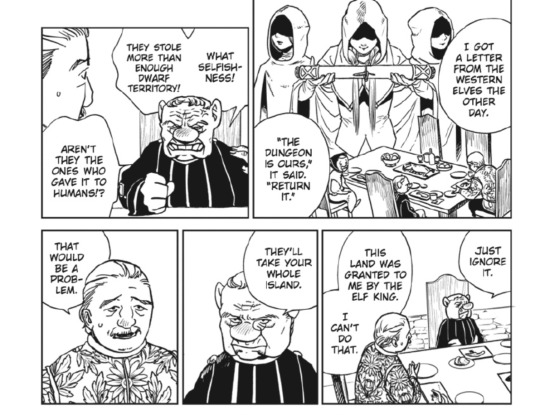
Language
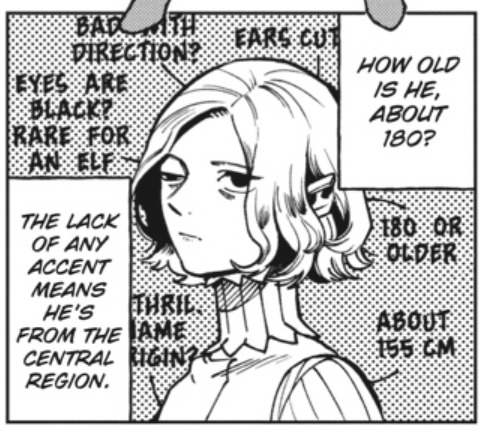
When Kabru says the "Central region" I expect he means the region where the NCC and SCC is.
The fact that he observes that the lack of any accent means he's from the Central Region is really interesting. It could mean two things;
either they switched to speaking in the language spoken on those continents, which Kabru would naturally know, having grown up there. It's 100 percent possible, but I think this would be noted in the story.
or, the language that gets called "the common tongue", the one that all our principle characters speak for most of the story, originated from the elves in the Central Continent. Or at least it's the same one that the elves use, and their political influence is great enough that their accent gets to be considered not an accent at all. The fact they were "granting" land in this area to tall-man lords suggests a large enough historical influence in the area that this is quite plausible to me.
Mithrun absolutely does have an accent - nobody speaks without an accent. His accent is just politically and socioculturally normalised to the point of being considered the "default/proper" way to speak - like received pronounciation in English.
The common tongue isn't ubiquitous everywhere - not just Kuro, but Kiki and Kaka are also noted to be studying the common tongue. The Tansus were born on the Eastern Continent, so probably gnome communities there speak their own language - Kiki and Kaka grew up primarily surrounded by gnomes after all.
It's also quite likely that Kabru, specifically, because of where he grew up, would consider Mithrun's way of talking to be the default "not an accent" accent. His adoptive mother surely has the same upper-class NCC accent. I expect that other characters might experience it as more "marked".
This isn't a world where everyone speaks the same language everywhere; the common tongue is called that, but there are many different languages. Kabru and Chilchuck are two characters who are adept with many of them - Kabru speaks the language of the kobold, and probably lots more. Chilchuck works as an interpreter as part of his union stuff - I can tell you from experience that that's a hugely valuable skillset in that context, as many of the people who most need union representation are people who don't speak the dominant language, or at least not fluently.
If you got all the way to the end of this post.... thank you for reading, I love you. Check out my other World Map Notes under that tag on my blog; I've made a few so far and there will almost certainly be more. Next I'm thinking the dwarven nations...? But I could be persuaded if someone had a preference.
Also, anyone got any speculation on what, exactly, is the previous time that Heimeya ate a person/monster/chimera that this panel implies:

We really don't have anything to go on whatsoever, but I think it's a fun tidbit.
#og post#dungeon meshi manga spoilers#dungeon meshi meta#dunmeshi#dungeon meshi analysis#delicious in dungeon spoilers#dunmeshi spoilers#delicious in dungeon#dunmeshi meta#the canaries#milsiril#mithrun#kabru of utaya#i feel sooooooo sane to have made this. but it has some super interesting details imo#colour coding only on the TLDR just cause I dont want ppl to take my theories as fact#character info I drop without a panel comes from the world bible#world map notes
339 notes
·
View notes
Note
Okay, this is going to sound insane, but please hear me out.
In the 19th century, there were doctors who specialised in curing "female hysteria", which was often just misdiagnosed sexual frustration (Whenever women were too out of control for men to handle, it was diagnosed as hysteria. So it was basically anything, sexual frustration included...). The cure was fingering...yeah. It was relatively normalised to, as a doctor, finger someone's wife...quite a way to make a living. There was basically a handbook written in Latin about how you do it (oil up your hand, insert here, there will be muscle contraction, the lady in question will breathe heavily before ultimately having a hysteria paroxysm (this is a former medical term for orgasms btw)). Obviously, there were mixed opinions about giving another man's wife an orgasm, however, the Catholic doctors concluded that it cannot have been sexual, since there was no penetration. "It's our duty as doctors to cure these poor women of their hysteria, Sir 🫡"
FUN FACT: Since some doctors would experience wrist pain from the...hard manual labour, they invented a device that does it for them: The vibrator. When the vibrator was first used in pornography, the doctors said NOPE and left their profession behind. In 2011, there was a period romcom made about this called Hysteria. It's not even that bad, unironically. Oh and by the way, the name hysteria is derived from the Greek word hystera, meaning uterus, hence why only women were diagnosed with hysteria.
Anyway, getting to my point:
Imagine a yandere thinking that you're being incredibly hysterical, emotional, out of control and then proceeding to sit you down and curing you of your hysteria the old-fashioned way...
They either do it knowingly, or are just too oblivious to even realise that what they are doing is...not quite the correct solution for the problems they caused you in the first place...
Just wanted to share this with someone...take it as you will...
,,, to be honest, I knew about the hysteria, but I didn't know about the fact that a vibrator was created that way,,,, sexy big brain<3333 i love your words so much, mercury kissed you at birth,,,, very brainy, very many cerebral convolutions, I love it,,, come here to kith kith pretty pie—
𝐁𝐈𝐎𝐌𝐄𝐂𝐇𝐀𝐍𝐈𝐂𝐒 𝐎𝐅 𝐋𝐎𝐕𝐄
your husband is so sweet, so adorable — especially when he's on his knees in front of you, purring something about how he should help you, as if it's not his personal fault that you feel like this.
... ♡ unhealthy relationship, misconception of the century / time, hierarchical society, mild sexism? (more classism?), mild maledom elements, mention of religion, forced marriage implied, male pregnancy mentioned because no pregnant reader, unethical treatment methods?; doctor!noble!husband x darling!reader
dubious consent (dubcon) -> consensual sex, crying, mild sadism/masochism, mention of degradation (g.), hair pulling (g.), oral sex (r.), mild fingering (r.), praise (r.)



If THEODORE had been told that he was "mistreating his darling spouse", he would have
agreed.
It was logical: if he treated you well, then would you enter into a frenzy of emotions, scream and look as if you were about to faint before falling at a table made of pleasantly smelling wood, — Theodore knew that you love this variety; almost all tables, chairs and other wooden utensils was of this sort, — completely exhausted, unable even to drive away your narrow-minded husband, only waving a fragile palm in his direction, as if desperate, while he took your fan, straight from the hands of the best chinese craftsmen, and gently fanned you, letting you hang head? Of course not.
You, his breathtaking spouse, were so touching and gentle, full of spring charm and a few drops of exquisite, expensive coquetry, like the first flowers in spring — delicate, almost transparent, not at all like the luxury of scarlet roses that gardeners grow every season, or the exuberant scent of lilac and juniper, especially in July. Not at all. Your charm was subtle, unique, corresponding to the rumbling of the first rivers or the first drop falling from the roofs after the melting of the snow. You have never been a socialite — never; parents were rich enough to support you and your siblings, but not rich enough to live in idleness and not worry about money.
You were introduced at the first ball and attended others from time to time, but most of the time you couldn't afford to walk around with "old dresses", not wanting to be considered poor or shame family by not being able to buy new clothes. Theodore understood perfectly well — being from a not-so-rich family, somehow coping with this whole world, you simply could not afford to live bohemian, expensive and shameless out of fear that money was too little, as if you did not even think that you could just marry someone rich and sponsor with their help your family. Theodore didn't blame, having heard about you for the first time from the mouths of other dandies who follow every new "coquette fan", more than an eloquent sign of finding a partner, though; "too conscientious and didn't understand how this world works" or just a prude,
but now, he understands that you just knew your worth and waited for someone like
him.
After all, in a world where divorce can only happen after death, and infidelity is punished by an enraged spouse with a knife, how could you easily marry someone? You were so alluring, like ripe peaches filled with juice — naturally, not everyone can and should touch your delicate, perfumed hands and caress skin so soft that no overseas silk can compare.
Theodore was sure that there were words about you: "If the cost of their kiss was hell, // then I will kiss their lips, // so that in hell I can brag to the devils // that I was in heaven without even entering it." Because you were paradise, it didn't matter if you smiled, cried or screamed — or were "not a couple who deserved," but only because you could have become the monarch's spouse right away, but he found you earlier.
He had no doubt that you were special — definitely to him. Therefore, he did not think long before he came to your parents to take you to his estate, in the sweetly itchy haste of first and only love, kissing your hands and touching the slightly trembling fan with thin fingers while you looked down in frightened amazement, while your parents confusedly exchanged glances, not understanding why he came to "court you". Theodore did not ask if you had someone — after all, if you had, you would rather slit your throat than let another touch your thin fingers, because he would have done exactly the same in your place if he were still a dependent young man (now, of course, he was not — having studied at a very prestigious university, where his parents also studied, he was more than an enviable independent bachelor and knew it). And if earlier he was afraid that, what if!, was not "normal", then when saw you, he knew that he had been waiting for you all this time — and you were undoubtedly waiting for him too.
If, in order to be with you, he had to refuse the sky, the sun and the moon, he would do it without hesitation. This is love — Theodore had no doubt that you yourself understand this.
Your parents, however, soon dispelled his prejudices. You didn't just "didn't understand it" — you weren't like that, but Theodore, hesitating only for a few seconds, realized that you just weren't like everyone else. While others were blinded by love, like him, you couldn't be like that — you just didn't understand it, didn't feel like that, and your parents were only afraid that your "defect" in the marriage market would make you lonely for the rest of days.
Theodore, however, did not think so: you were the same age as him, he was childless, unmarried, rich and educated, had an estate with intelligent and trained servants, good sources of income, a lot of free time, did not have the habit of drinking a lot of alcohol or tobacco, — and the fact that you were allegedly "not sensual enough" was, of course, stupidity. He wasn't going to use the fact that you can't pick up a knife to kill an unfaithful spouse! And I wasn't going to cheat! He won't do any harm! Yes, you may be a little... very very little defective-ish, but isn't love blind? He will accept you at any cost, even with such a... 'setback'.
... Of course, it is wrong and even abnormal that you cannot kill someone who is cheating on you, and are not ready to die just to be with someone you love, and that it is wild for you to give up everything for your beloved... But Theodore understands that you are already too perfect, and it's okay to have flaws. He's not thirteen anymore.
As long as this is not passed on to children, everything will be fine, please, don't worry, ma joie, — he gently whispers to you, touching gloved fingers, stroking fingers gently, looking into your very happy face ? — I'll accept you for who you are, even with this. With everything. Because you and I, being whole by ourselves, become more than just "ourselves" together.
And it was true, don't get him wrong! His pedigree was good, he was, uh, "thoroughbred," and his family tree was beautiful, worthy of your hand. Theodore was not self-confident, but he was confident, buying everything you want, not walking through salons and entertainment houses and not being in any dubious circles, his entourage was only intelligent people who had an education and could both write and read, and not in two languages, and there was no one in his circle someone of the same gender, and he wasn't squeamish or suspicious. After all, what else can you worry about? But you were worried. Over time, it's even a little noisy.
You shouted, sometimes threw yourself, behaved strangely, as if he was not a refined learned man who was your shadow and wrote poetry to you, not forcing you to do anything even after your approved marriage, but a brute or an invader. Did he take you away without permission? Perhaps using his status in society to a little and influence your parents with children who have not yet appeared to the beau monde, and used a little influence to convince these people that he will help your siblings in the future to find a better match than they can now count on — but then why does he need it: status, influence, reputation, — if he can't even convince his love to stay with him? Otherwise, you can't blame—
... Oh wait.
You can.
Theodore realizes with annoyance, sitting hs office with a book in hands, writing notes in diary, and adjusts his glasses: he had completely forgotten — you're "not like that." You're different. Your parents told him. You understand love differently, you look at your partner differently, you cannot understand the concept of love itself... Theodore used to think that they just raised you wrong, but now he understands what they meant: that the feelings that ordinary people spend on a partner, you leave inside, letting them accumulate, and when you realize that you can no longer, you emotionally explode and behave as if something is wrong with him or you — it's obvious! You just can't do it any other way! Of course, why else would you be unhappy with your situation? After all, it's natural that your family hardly communicates with you or that you can't spend a lot of time outside the house — everyone lives like that, except the unmarried! You just don't understand it!
Because you are so emotional, so sensitive, so responsive, that, naturally, you need special care and care, and not a sidelong glance from your husband, who behaved so coldly, only supporting, but not helping you in any way! After all, he studied at the best university, was one of the best students, even had an internship and, of course, corresponded with his comrades, learning new ways to deal with diseases and disorders. After all, what kind of "good husband" is he if he can't even help his gentle, easily excitable spouse cope with their, he's not afraid of that word, illness?
You just don't understand...
“... Darling, we need to make one thing.”
You are gentle, soft, not submissive — both in clothes and under them, and although you may consider him a little pathetic when he whispers it to you, burying cold nose in your thigh like a lost dog, but after shouting and throwing things, you are no longer so full of destructive energy. Holding him tightly by the hair, you look down with pursed lips, but do not answer anything — and in expensive clothes, with jewelry, sleek and clearly not deprived of the love and affection of a bohemian husband, you look like a deity that descended from heaven.
Theodore knows that he must decontaminate for sure, but what can a spouse hide from a spouse, right? After all, you are more than a "single whole", especially when he is sitting on his lap, no problem as long as you are sitting on a chair made of your favorite wood, soft and comfortable enough, allowing him to carefully get rid of excess clothes without disgrace, looking at how thin lips touch your skin in a respectfully pious way.
Even your heavy breathing from the outburst of emotions sounds like music that should be played in the church if they want the heavenly ambassadors to descend.
Is he too "sugary"?
No, he's just a realist.
“Darling, please...”
You don't push away even when fingers gently touch your thighs like feathers, just frowning a little harder. But not by pushing it away. You are smart, you always have been, and, of course, you yourself understand that you are sick, and only he, as your husband and doctor, can help you. It's natural. Why do you need another men- or women- another doctor? How dare someone else touch you? Only you can touch him and only he can touch you. He's yours — a husband, a doctor, anyone. As soon as you become healthier, he will definitely be your lover — and maybe one day you will take a child or will he carry it. After all, how dare he sleep with you and use you, so gentle and airy, like a messenger from heaven, while you are so deeply ill, not even really knowing what love is and how to react to it?
“Darling... It's just a little help. Just say the word and we'll stop anytime. I don't want to harm my spouse, you know... Besides, you can always stop me by force.”
You yourself spread your warm, soft, almost plush thighs while he meekly looks up from the bottom, trying to unobtrusively encourage you to let him just look a little. Theodore was not an expert on issues related to sex life or the influence of genitals on human behavior, — although, undoubtedly!, it was important, but he preferred less dirty things, — but now, kneeling in front of you on a soft carpet, stroking your skin, it did not seem something vile or dirty, animal, but for some reason pleasant and... airy-natural; the very sight made him want not to wince and turn away, but not to look away, even when you pull his hair harder, frowning, clearly not too willing to continue this, but it's better than if he drags you to someone else.
You knew yourself that your husband sometimes got too involved with the human body in a not too, uh, "harmless" sense, but it was never dangerous or illegal, unless against the law of god, so you let him correspond with 'friends' and 'colleagues', studying new diseases and learning more about experience and practice. But if you knew that one day you would be the subject of research, you would definitely throw his ink and letters into the fireplace — along with other things.
“Mi único... I want to help... Do you know what hysteria is? This is when a darling behaves very much... emotionally because of the internal tension. And so we have recently come up with a... new way to deal with similar diseases. It can help our marriage... Te quaeso?”
Theodore is not an idiot; rather, he feels like a trainer or a tamer, gently pushing and touching, without making any sudden movements while you look at him, gradually relaxing the tense body, letting his fingers, slightly slippery from oil and disinfectants, touch the delicate skin of the inner thigh, massaging and stroking, not hurrying. He doesn't have much experience — practically none, you never shared a bed even after the "wedding night", — but there is enough theory and ideas how to use it, especially when thin, slightly cool fingers slowly touch the skin under stomach, stroke as lightly as possible along a sensitive line, kissing with warmed lips the skin. If he could, he'd love to just open his mouth and eat you, or at least nibble — but he's not the type who eats his darling and then walks around saddened widowers and widows without the opportunity to remarry, he's a more sophisticated type and definitely not that creepy, even if the way you are you pull his hair as fingers gently circle around, rubbing and stroking, using precum for better contact, makes his eyes water and his mouth open slightly, breathing, feeling too ambiguous even for a "husband", let alone the role of the "doctor" in which he was.
“Please... d-darling...” He chirps something slightly hoarsely, stroking, caressing, breathing every other time, as if you are holding not by the hair, but by the throat; when his fingers tremble slightly, you hiss, making him blush slightly shamefacedly, as if from your swearing, — but he tries not to break the rhythm, ignoring, as befits a refined well-mannered husband. Do well-mannered husbands use their fingers on their spouses? Theodore doesn't have that much experience to respond, especially when you flinch slightly, curling your toes, — and he wants to bite just to remove this strange shameful, almost perverted feeling of a mixture of lust and guilt inside, clearly not too approved by religion, but when you start breathing shallowly and harder, closing your eyes, Theodore moves his fingers faster, watching your face.
Is that right? You don't hold him so tightly, but don't take your hand away, and his fingers are so slippery and wet that he's almost ashamed, as if it's all his juices, and he definitely should at least look away, but this is scientific curiosity, just curiosity, even when he changes his position, sinking lower shamelessly, feeling himself for a moment, it really was some kind of fallen man from entertainment houses, with an implicit gurgling feeling in the lower abdomen, listening only to your breathing and slightly squelching sounds. Theodore hardly breathes, looking at his fingers, trying for a moment to distract himself with the fleeting thought "good that cut nails" — but when your... your bare foot touches his shoulder, it seems so perversely seeing your calves that he does not know where to look — freezing for a moment, his eyes are drawn only to you, even if it looks so... sweetly vulgar, completely wrong, — but you're already married, so it's okay even if you're not like that, right? It's okay when he sees something below your neck and bare arms, it's okay when you squeeze his hair tightly again, it's okay when he hears your hot, loud breathing, as if you're breathing directly into his red ears, although he can't even look up from the way you're holding him.
Your fingers are strong, dexterous, squeezing his strands so hard that he can't move anywhere, but for some reason he is too pleased with this than he should be, even when Theodore feels like you are pushing him even closer shamelessly, as if he is not your, actually, noble and high-minded husband, who is now plays the role of your doctor, helping you with your "hysteria", but some kind of fun boy!
Outrageous!
“D-darl-!~”
You hiss something, almost growl — and pull too hard, forcing Theodore to briefly let out a distant sigh without resistance — and obediently open his mouth, hastily removing his fingers so as not to interfere before he finds a new, more comfortable place. His eyes are slightly watering from the mild pain, but when he does not see a shadow of the old irritation or anger in your face, he obediently sticks out the tip of his red tongue, not trying to shirk his doctoral duties — or is this already a marital duty? Theodore doesn't know, he's not sure, — especially when you hold him even tighter, not listening to what he says, knowing that if he really was "against it", he would have already got out, and not looked at you like a fawn at a hunter, as if it wasn't because of him that you were here, with legs spread apart and heavy breathing from the heaviness in the lower abdomen.
Is this really what he was taught at university?
A boy for fun.
The corners of your husband's eyes turn red, but he does not try to say anything or justify himself, — why should he? — making inarticulate sounds, but only moving his head, hesitantly holding your hips as much as he could do it respectfully and unobtrusively; after all, he is a learned man, even if he was kneeling like some kind of animal or a slave.
When Theodore awkwardly, clumsily moves his tongue, trying to make sure that you feel good, for some reason the world feels much brighter and sharper, — especially when the heat gets stronger, making you tremble slightly, feeling a wide tongue and thin flexible fingers, as if they are perfect only for this, but there is less air in your lungs than you need to continue dirty deservedly whisper to him how low he has sunk, from his 'writing letters to the best doctors he studied with' to kneeling in front of his spouse.
It's not that you're going to stop him or let him change his position, of course, but just force him to continue doing what he's good for, while he's almost meowing, almost purring, not trying to pull away anymore.
... It's not that he's wrong, though.
You definitely feel better after a little therapy.

#.spicy♡#ৎ୭ — little puddings#🍮.yandere#🍮.maledom#🍮.unethical#🍮.hierarchical society#🍮.dubcon#🍮.fingering#🍮.degradation#🍮.rough#🍮.praise#gender neutral reader#yandere x reader#cw yandere#dom reader#?#implied#🍮.s/m#cw dark content#ৎ୭ — work
76 notes
·
View notes
Text
It's a shame Anakin was born in a the time before Empire vs Rebellion. In the before-time there were such strict lines and laws. Jedi have to follow this code and these rules etc etc. They become part of a strictly hierarchic military.
Rebellion time? Utter chaos. Oh so you're a Jedi and you have a family? Cool. Our chances are zero, but the cause is noble? Oh yeah. One X-Wing pilot vs the Empire suicide mission? Count Anakin the fuck in. He would've thrived as a member of the Rebellion, I just know it.
#thought about this while rewatching rogue one#anakin would've loved that shit#star wars#rogue one#anakin skywalker
324 notes
·
View notes
Text



me realizing i can just infodump and repost about my ocs and world on here without worrying cuz my posts only get three likes each time, ALSO I FORGOT TO DRAW HER FRECKLES IN THE FIRST PICTURE IM SORRY:
Svetanya

Svetanya, long for Sveta, is a deer satyr. She's pansexual, her pronouns are she / her, and she's trans (specifically identifying as transfemme, and probably deer-related xenos in a modern!AU). If you really wanna get specific, I think she socially transitioned at a very early age (probably 7 or 8), but doesn't want to medically (or magically) transition. (of course I added magic transition, queer fantasy is supposed to be fun!). In these pictures, she's around her late twenties.
Satyrs often live in very communal environments—lack of an enforced hierarchy, individualism, large, ambiguous family units—the whole shebang. Unlike Atlanticians (Merfolk / Seafolk) and harpies, who get along based on similar hierarchical societies, satyrs do not get along with either on the same basis. Sveta, however, is unique in the sense she was not raised in a communal satyr circle.
Although living amongst satyrs is considerably ideal for a lot of humans, satyrs are often targeted by predator animals like bears or wolves as if they were actually animals. The communal living style, similar to herding behaviors, is useful to avoiding attacks, but not full proof. Not only this but the primarily rural lifestyle relies on the environment, of which several factors can decrease crop yields and production. As a result, living in a satyr herd can be quite difficult and challenging.
Sveta's parents, who acknowledged this significant challenge, were tired of predation. So, as a solution, they decided to integrate into a more urban, human-centric society.
Sveta, growing up within a rigid class structure, adapted personality traits and behaviors unlike any other satyrs. She can be arrogant, ignorant, sardonic, and sometimes vain and self-important. Though not only are these traits informed by her upbringing, but by the people she surrounds herself with. She was taken up by a certain human noble, Aylin Ernheim, impressed with her eye for fashion, and gave her a job as a tailor. Something both her parents were weary about, but allowed.
Aylin, in his neglectfulness, allows Sveta to face the brunt of abuse from other vain, self-important nobles. Although on the outside, she parades herself as bold, confident, and snarky, she's only really kept around as upholstery. She's deeply aware of her class, and thinks of herself as someone who exploited others to get where she is. In other words, a bit of imposter syndrome. Despite her sometimes rude honesty and lack of a filter, she knows where the boundary is because it's made implicitly clear.
Sveta also struggles with objectification. She cares a lot about appearances, and can unhealthily fixate on her body (fur, height, face, hair, antlers, clothes) due to her lack of self-esteem. When stripped of the exterior, she's overwhelmingly quiet, observant, and introspective. A type of quiet that'd make you think she was judging you, but she's really wondering if you're judging her.
Kinda went hard into all the negative aspects of her but she has positive aspects too guys, I promise!!!
Because she feels obligated to do stuff for others, she's very supportive, caring, and sensitive. Even if she's kind of being a brat to you while she does it. She's also witty. Satyrs are usually taught more practical skills in agriculture but her intelligence is purely based on word form rather than movement (also because she's just not strong enough for farm work, VERY fragile in terms of super heavy physical labor like that, and especially because of her antlers which are her pride and joy).
Because of her body image issues, she gets bouts of depression—sort of like seasonal depression—when her antlers annually shed (like real deer!). I wanna draw her when her regrown antlers are short and velvety, i think it'd be cute.
#wlw#black ocs#oc tag svetanya#sapphic ocs#wlw fantasy#infodump#oc info#satyr oc#long post#shes a goober#such a goober#i will give her a girlfriend and a sugarcube guys eventually
47 notes
·
View notes
Text
Do flowers bloom from walkers? (Radical optimism in The Walking Dead: The Final Season)
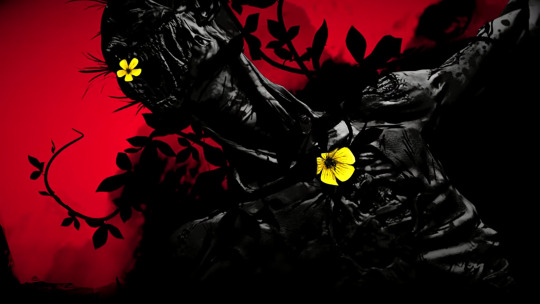
I remember playing The Final Season for the first time way back in October of 2022 and immediately being blown away by how polished the game was in comparison to its predecessor. I mean I had always loathed the visual style of A New Frontier, so this comic-book inspired look was a nice change of pace, especially once combined with the expert use of lighting that is present throughout the game. But what really took me off guard, more so than anything else, was the opening credits.
I mean, obviously; these games had never done anything like this before. And while I'm fond of the whole FADE IN TITLE ACCOMPANIED BY OMINOUS MUSICAL CUE, this was a welcome change. But there was one specific image that stuck with me throughout my playthrough: the decomposing walker (pictured above), painted in greyscale, with the only colour being the stark red background and the yellow flowers blooming from its corpse. I like to think that it was an intentional decision that ties into the game's themes and not just "Oh this looks cool, let's do it", but it weirdly never came up again. So I was kind of just left to play the game while it loomed in the back of my head, waiting for its moment to shine.
It wasn't until almost a year later where I'd figure out what the image represented, or at least my interpretation of it, and I settled on this conclusion: this decomposing walker is supposed to represent this apocalyptic world, and the flowers symbolise the people that attempt to build from it, in this case the Ericson's kids.
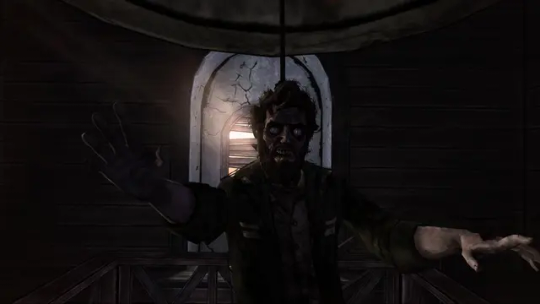
I've had this opinion for a while that if the first three games show the attempts and failures to re-establish the old world ideals of order and civil society, then The Final Season serves as a rejection of that idea. From the walker-ridden fortress of Crawford in Season One to the bureaucratic nightmare that was the New Frontier, it's an accepted fact that these attempts at returning to the methods of days gone is ultimately futile and will result in total collapse, largely due to the decisions of its rulers. While we could argue about which of these groups is truly the worst, they all originate from the same basic principle: a desire to return to normality. Crawford, Howe's, the New Frontier; these groups were formed by people who, while cruel and monstrous in their own ways, all had the admittedly noble goal of attempting to return order to this ravaged world, but failed due to their leaders' cruel and selfish actions.
Or did they? (Vsauce sfx)
There's this interaction Lee has with Katjaa in the very first episode of Season One that has stuck with me for a while. It's an optional dialogue so it's very easy to miss (I did on my first playthrough), but when Katjaa hopes that things can go "back to normal", Lee has the option of expressing resentment for this old world:
"But they weren't before? The banks, the politics, the--the crap--those things are gone. Hell comes in a lot of different colors."
Usually this "fuck the old world" sentiment is expressed by sociopaths who are excited to enact their sadistic desires onto other survivors, but Lee's resentment for society feels a lot more justified. The fact that Lee is a black man who's specialty is American history makes his criticism of wanting to go back to how things were feel more warranted; he's someone who understands how corrupt and unjust the societal structure of the past was, so of course he'd feel conflicted about longing for its return.
And while this is just a small interaction, I feel it plays into what I've been talking about. Crawford, Howe's, the New Frontier; did these factions collapse because of their evil leaders, or because they were emulating an inherently unjust and corrupt power structure? Their desire for order and stability allows them to see past the cruelties that came with building these hierarchical societies, to the point where they begin to mimic governments of the old world (Crawford, discrimination and the outlining of "undesirables"; Howe's, prison labour and terror; the New Frontier, imperialism and state corruption). So these failed factions force us to ask the question: is a return to order possible in this world?
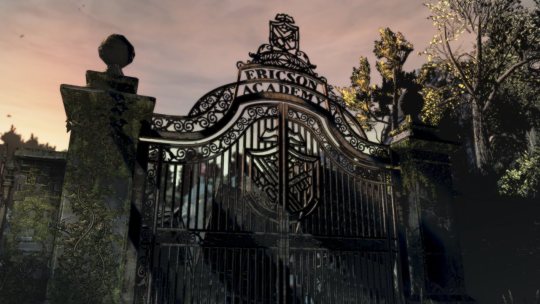
It isn't until the The Final Season that the games give us an answer to that question: no, it isn't, but that doesn't mean you can't start something new.
When introduced to Ericson's it's made immediately apparent how different they are to any other group we've met before. While there's the obvious homage to Lord of the Flies with a group being made up of entirely children, I think this is more than just a "well it's the final game, best do something interesting". Children are a symbol of hope and optimism, but also of potential and, in a more abstract sense, the future. They are clay that has yet to be moulded, with infinite potential, a luxury most adults don't have. So I don't think it's a coincidence that the main group in this game, and the one that Clementine eventually settles with, is comprised entirely of children: it feels like an intentional choice to highlight how this group will be the one to survive on account of how they have the potential to create something new.
And it's not just their age demographic that makes Ericson's so distinct from the other groups in the series, but also their power structure. Following Marlon's death, their is no one person in control of the group. Sure, there are leaders (Violet takes the chair once Marlon's out of the picture, and upon her return Clementine becomes the one who's advising the group), but they feel like role models and advisors more than anything. When Violet takes the reigns it doesn't seem like anyone truly acknowledges her authority, and she doesn't even seem to enforce it either. Same goes for Clem; she doesn't really express any desire to control the rest of the group, instead preferring to make decisions in a more democratic manner as to include everyone's individual skills and expertise.
Ericson's vision of society more closely resembles that of an anarchist commune than any government that previously existed, and it manages to be the only group left standing by the end. It's through cooperation and an altruistic attitude that keeps them alive in the end; their concerns for the survival of the group far outweigh any desire to create "order". And I don't think it's a coincidence that a majority of the game's antagonists (Lilly, Minerva, and even James) are people who represent the past. Lilly is obsessed with the cruel lessons her father taught her and prides herself in her attachment to the militaristic level of discipline that she inflicts upon her subordinates. Minerva is essentially a ghost of the past, with her whole arc with Violet and Tenn serving as a lesson on the dangers of holding onto the past. James, while good natured and mostly kind, can't bring himself to accept the fact that the world has changed, and its these beliefs that either kill him or sever the only connection he had made in years.
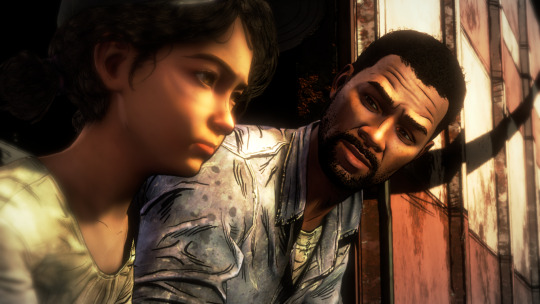
To conclude, while Telltale's The Walking Dead is a series that is rife with conflict and tragedy, I also find it to be a story that is ultimately about hope. I always considered that Lee's greatest lesson to Clementine wasn't how to shoot a gun or to cut her hair, but instilling within her a radical sense of hope, the idea that things can be better, and you should always try your damnedest to make it happen. That even in the most desolate of circumstances, something profoundly beautiful can bloom.
Or maybe I've been wrong this whole time and flowers growing out of a walker just looks really cool.
#i didn't expect this to be so long but oh well#needed to rant about twdg so i chose this instead of the wall#twdg#the walking dead game#clementine#twdg clementine#lee everett#media analysis
71 notes
·
View notes
Text
Kuroshitsuji: an analysis on "fagging" and a change of power dynamics between characters
I know how disappointed some fans are regarding the "politically correct" presentation of Ciel and the overall "fagging" culture that was common back then at elite boarding schools in the UK. From what I have heard from people slightly older than me, this was a thing that carried on into the late 90s in certain private schools. As of now, I am sorry, I don’t know anyone rich enough to ask them regarding those things.
However, what I can say about this matter is that a) this practice is can be found almost anywhere in the world (mostly in universities), b) it is about power exchange and how it leads to respecting tradition and bond with other students, c) I am part of it in my own university and d) it’s deliciously represented in Kuroshitsuji, in a way that somehow gives us a different perspective over what Ciel can and cannot do, limiting his actions, something that he, as a powerful noble, is not used to.
Fagging
In many countries and cultures cross the world, "fagging" has many different names, and many different forms. In the US you have fraternities and sororities, here in my country you have the "Praxe". In the UK you have (had?) fagging, in which consisted exactly on younger students doing most part of domestic tasks that were supposed to be made by older students. The older the students were, the more power and status they gained inside the institution, and therefore the more privileges they had. In consequence, although these fags didn’t have an easy life, they still had some sort of protection and status themselves for serving someone older. This creates an hierarchy based on age, more specifically just academic age.
Ciel, as being someone young is, of course, at the base of this hierarchical system. Someone who is used to be at the top of the hierarchical ladder is going to struggle to adapt to a new environment, one in which he simply cannot understand/agree with the traditions imposed. This will create a certain obstacle at first, because he needs to learn how to navigate in a different society so different and, at the same time, so similar to the one he belongs to: the only difference being where he stands. And we see Ciel, for the second time in his life, working himself from the the way down to the way up.
In the first time, his birth condition (well, let’s assume we are speaking about Ciel’s condition, and not o!Ciel’s one at least) gave him a kickstart in life: a manor, monetary goods, a title. In this case, he is a mere 1st year student, and he must subjugate himself to the desires (sometimes sadistic) of older students, especially Clayton at first.
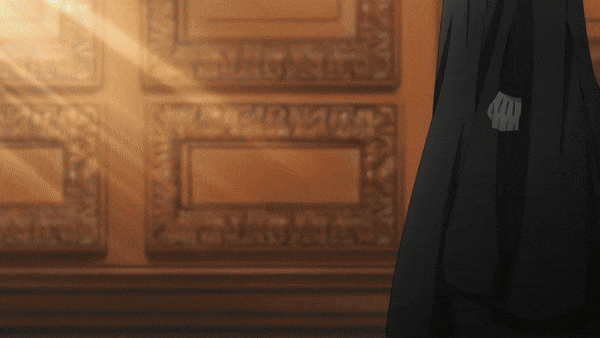
Psychological Implications
It may be complicated from Ciel, even more taking in consideration how prideful he is, to swallow that pride and abide by traditions he a) doesn’t relate to b) finds useless and c) seeing himself without a lot of power to swiftly surpass those obstacles. Ciel is not there in order to live the academic traditions that are present around him, nor to make friends, of course. And, in the end, fagging and these other academic traditions open the door to just that: when people suffer together they usually stick together. This is the meaning of fagging, Praxe, and all the other academic traditions listed. And this is not what he is searching for. Which puts a little bit of strain on him, and he ultimately might think they are extremely childish and ridiculous.
Another interesting aspect of this overall power exchange here is that Sebastian is in a higher position of power than Ciel, as opposed to their base situation. This is, of course, extremely debatable, and the power that each one of them holds in their master/servant (no, I am not talking about that sort of thing… eww) is quite mutable, and, at times, one may hold more control over the other, and that is changing. Here we have a third factor contributing to that mutable power exchange: a different environment, where Sebastian’s position allows him to be seen as more respectable. And this is extremely delicious to see when he lets Ciel undergoing the initiation ritual with the bedsheets and being thrown: Sebastian is, obviously, enjoying himself at the expense of his master’s suffering, since in normal situations he simply cannot do that, at least not as frequently. To Sebastian this is cathartic, and to Ciel (Sebastian’s master) this must feel extremely insolent. Especially because Ciel is someone who likes to always be in control, having in consideration all he went through.
Undergoing this traditional upbringing will, hopefully, provide Ciel either the necessary tools regarding being more self-reliant and independent when it comes to Sebastian because, even if the demon is able to help him out with all the domestic tasks that he needs to do, who knows what will happen when Ciel loses (even if just temporarily) Sebastian one day (which, as another post explained, it might happen sooner than we think).
By being a fag and by navigating a position in which he is in a lower position, Ciel can’t find many shortcuts to success, and he will need to a) rely on his interpersonal skills, b) make connections with other students, c) be aware of what’s going on, socially, around him (read the room) and d) use his insight more than the sheer force and threats of Sebastian.
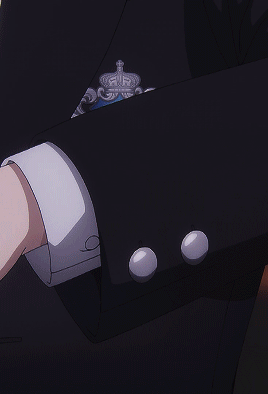
#kuroshitsuji#black butler#ciel phantomhive#public school arc#anime#manga#meta#analysis#character analysis#writing#culture
59 notes
·
View notes
Text

A.2.6 Why is solidarity important to anarchists?
Solidarity, or mutual aid, is a key idea of anarchism. It is the link between the individual and society, the means by which individuals can work together to meet their common interests in an environment that supports and nurtures both liberty and equality. For anarchists, mutual aid is a fundamental feature of human life, a source of both strength and happiness and a fundamental requirement for a fully human existence.
Erich Fromm, noted psychologist and socialist humanist, points out that the “human desire to experience union with others is rooted in the specific conditions of existence that characterise the human species and is one of the strongest motivations of human behaviour.” [To Be or To Have, p.107]
Therefore anarchists consider the desire to form “unions” (to use Max Stirner’s term) with other people to be a natural need. These unions, or associations, must be based on equality and individuality in order to be fully satisfying to those who join them — i.e. they must be organised in an anarchist manner, i.e. voluntary, decentralised, and non-hierarchical.
Solidarity — co-operation between individuals — is necessary for life and is far from a denial of liberty. Solidarity, observed Errico Malatesta, “is the only environment in which Man can express his personality and achieve his optimum development and enjoy the greatest possible wellbeing.” This “coming together of individuals for the wellbeing of all, and of all for the wellbeing of each,” results in “the freedom of each not being limited by, but complemented — indeed finding the necessary raison d’etre in — the freedom of others.” [Anarchy, p. 29] In other words, solidarity and co-operation means treating each other as equals, refusing to treat others as means to an end and creating relationships which support freedom for all rather than a few dominating the many. Emma Goldman reiterated this theme, noting “what wonderful results this unique force of man’s individuality has achieved when strengthened by co-operation with other individualities . .. co-operation — as opposed to internecine strife and struggle — has worked for the survival and evolution of the species… . only mutual aid and voluntary co-operation … can create the basis for a free individual and associational life.” [Red Emma Speaks, p. 118]
Solidarity means associating together as equals in order to satisfy our common interests and needs. Forms of association not based on solidarity (i.e. those based on inequality) will crush the individuality of those subjected to them. As Ret Marut points out, liberty needs solidarity, the recognition of common interests:
“The most noble, pure and true love of mankind is the love of oneself. I want to be free! I hope to be happy! I want to appreciate all the beauties of the world. But my freedom is secured only when all other people around me are free. I can only be happy when all other people around me are happy. I can only be joyful when all the people I see and meet look at the world with joy-filled eyes. And only then can I eat my fill with pure enjoyment when I have the secure knowledge that other people, too, can eat their fill as I do. And for that reason it is a question of my own contentment, only of my own self, when I rebel against every danger which threatens my freedom and my happiness…” [Ret Marut (a.k.a. B. Traven), The BrickBurner magazine quoted by Karl S. Guthke, B. Traven: The life behind the legends, pp. 133–4]
To practice solidarity means that we recognise, as in the slogan of Industrial Workers of the World, that “an injury to one is an injury to all.” Solidarity, therefore, is the means to protect individuality and liberty and so is an expression of self-interest. As Alfie Kohn points out:
“when we think about co-operation… we tend to associate the concept with fuzzy-minded idealism… This may result from confusing co-operation with altruism… Structural co-operation defies the usual egoism/altruism dichotomy. It sets things up so that by helping you I am helping myself at the same time. Even if my motive initially may have been selfish, our fates now are linked. We sink or swim together. Co-operation is a shrewd and highly successful strategy — a pragmatic choice that gets things done at work and at school even more effectively than competition does… There is also good evidence that co-operation is more conductive to psychological health and to liking one another.” [No Contest: The Case Against Competition, p. 7]
And, within a hierarchical society, solidarity is important not only because of the satisfaction it gives us, but also because it is necessary to resist those in power. Malatesta’s words are relevant here:
“the oppressed masses who have never completely resigned themselves to oppress and poverty, and who … show themselves thirsting for justice, freedom and wellbeing, are beginning to understand that they will not be able to achieve their emancipation except by union and solidarity with all the oppressed, with the exploited everywhere in the world.” [Anarchy, p. 33]
By standing together, we can increase our strength and get what we want. Eventually, by organising into groups, we can start to manage our own collective affairs together and so replace the boss once and for all. ”Unions will… multiply the individual’s means and secure his assailed property.” [Max Stirner, The Ego and Its Own, p. 258] By acting in solidarity, we can also replace the current system with one more to our liking: “in union there is strength.” [Alexander Berkman, What is Anarchism?, p. 74]
Solidarity is thus the means by which we can obtain and ensure our own freedom. We agree to work together so that we will not have to work for another. By agreeing to share with each other we increase our options so that we may enjoy more, not less. Mutual aid is in my self-interest — that is, I see that it is to my advantage to reach agreements with others based on mutual respect and social equality; for if I dominate someone, this means that the conditions exist which allow domination, and so in all probability I too will be dominated in turn.
As Max Stirner saw, solidarity is the means by which we ensure that our liberty is strengthened and defended from those in power who want to rule us: “Do you yourself count for nothing then?”, he asks. “Are you bound to let anyone do anything he wants to you? Defend yourself and no one will touch you. If millions of people are behind you, supporting you, then you are a formidable force and you will win without difficulty.” [quoted in Luigi Galleani’s The End of Anarchism?, p. 79 — different translation in The Ego and Its Own, p. 197]
Solidarity, therefore, is important to anarchists because it is the means by which liberty can be created and defended against power. Solidarity is strength and a product of our nature as social beings. However, solidarity should not be confused with “herdism,” which implies passively following a leader. In order to be effective, solidarity must be created by free people, co-operating together as equals. The “big WE” is not solidarity, although the desire for “herdism” is a product of our need for solidarity and union. It is a “solidarity” corrupted by hierarchical society, in which people are conditioned to blindly obey leaders.
#faq#anarchy faq#revolution#anarchism#daily posts#communism#anti capitalist#anti capitalism#late stage capitalism#organization#grassroots#grass roots#anarchists#libraries#leftism#social issues#economy#economics#climate change#climate crisis#climate#ecology#anarchy works#environmentalism#environment#solarpunk#anti colonialism#mutual aid#cops#police
48 notes
·
View notes
Text
ATEEZ'S ROYAL BLOOD
A dive into the members' lineage following their new song about royalty.

August 4, 2024 (5:01PM)
ATEEZ recently released another collaboration with BE:FIRST titled Royal and it encouraged some netizens to conduct research on the lineage of the members, which led to the rather surprising discovery that the lyrics 'Check my Royal blood' were indeed true. While clans no longer hold any hierarchal power in Korea and are slowly fading into nothing more than history, it is still interesting to learn about the impressive gathering of nobility in one singular group.
The group's captain, Hongjoong, hails from the Gwangsan Kim clan which is a royal family as per its members' blood relation to the third son of King Sinmu of Silla, Kim Hung-Gwang. The eldest, Seonghwa, is a member of the Miryang Park family who held the title of royalty as well since they descend from 10th century Prince, Park Eon-Chim, the son of King Gyeongmyeong of Silla. Their stunning visual, Yeosang, belongs to the Jinju Kang clan which is an honorary military family, much like main rapper Mingi, who comes from the Yeosan Song clan, which is one of the oldest Korean clans. The Choi brothers, vocalists San and Jongho, descend from the noble Gyeongju Choi family, whose mottos as well as stanzas focus on being a genuine person and helping others. Two of the group's members, Wooyoung and Yunho, have not yet confirmed their clans.
The most impressive lineage however is their youngest, Himari, who has inherited noble blood from both parents along with direct descent from figures linked to the thrones of both Japan and Korea, which would now offer a different meaning to the nickname Hime (princess) that members often use. The maternal side of her family hails from the Konoe aristocratic family, whose parent house is the Hokke branch of the Fujiwara clan, a powerful family of imperial regents who sat on the throne for twelve consecutive years. Her family tree reportedly includes Konoe Sakiko, the mother to the 108th Emperor of Japan, Emperor Go-Mizunoo, the first to reign entirely during the Edo period.
The paternal side of her family hails from the Yeoheung Min clan who were granted the title of nobility and descends directly from Empress Myeongseong, who was the first Queen of Joseon assassinated by the Japanese since the foundation of the Joseon dynasty in 1392. It was known that she was more active in political affairs than the King himself and was the first Queen to have contact with the West, due to her reported outstanding diplomatic attitude.
The most notable example of people finding this royal link almost intuitively would be fashion designer Donatella Versace, who has mentioned several times that the vocalist seemed to have the grace of a princess, which is what drew her in. It has also been noted by people that she along with San seemed to have kept some of these noble mannerisms and could almost be mistaken as such at first glance.
After being recognized by the man named 'King of K-Pop' by the nation, one could argue that Himari is getting closer to sitting on a golden throne, though not ruling over a nation but an industry.
Share This Post

#ateez au#ateez imagines#ateez 9th member#ateez extra member#ateez female member#kpop oc#himarinews♡#himarilore♡
36 notes
·
View notes
Text
Bad Batch ancient Egypt AU
Bad Batch AU Egypt
Introduction
In a land, thousands of years ago, the sun was always shining and life depended on a river. The vein of life, the Nile. The visual representation of Hapi.
This idea came to me, because of personal interests, research and work. I decided to try it, and not be overly too specific with the practices and dynasties. Basically mushing the kingdoms a bit together, so I can really try to also educate in a way. I will try to link information which may confuse, or try to explain it within the story. I a always open to answer any questions.
The start may be a bit well, I either struggle to write the start or not.
Masterlist
Chapter 1: Introduction
Ancient Egypt, a civilization at its zenith with grand pyramids, intricate temples, and bustling cities. The society is hierarchical, deeply religious, and technologically advanced for its time. The Nile River is central to daily life, agriculture, and trade.
Characters:
Hunter: A renowned general in the pharaoh's army. His keen senses make him an exceptional tracker and strategist. Hunter is known for his loyalty to the pharaoh and his unmatched ability to lead and inspire his soldiers.
Wrecker: A formidable warrior and a chief builder of the pharaoh's monumental projects or the noble families. His incredible strength is legendary, and he is often seen leading the construction of temples and houses, as well as defending them from threats.
Tech: One of the palace scribes and inventor, creating advanced tools in his free time and managing the vast records of the kingdom. Tech's inventions aid in agriculture, construction, and even in the military, providing strategic advantages, like making the chariots sturdier.
Echo: A high-ranking advisor and oracle, often seen as a bridge between the mortal world and the gods. Echo’s wisdom and foresight are invaluable in both governance and warfare. His insights are considered divine messages from the gods. Which he recieved after a horrific accident as his time as a soldier.
Crosshair: The pharaoh’s elite archer and hunter, known for his deadly precision. Crosshair protects the royal family and hunts dangerous game. His skills are also employed in strategic assassinations to eliminate threats to the kingdom. Or to keep the harbour safe, spotting foreigners before others can.
Omega: A young priestess in learning considered to be a prodigy blessed by the gods. Omega's unique abilities and pure heart make her a beloved figure among the people. She often assists in rituals and tries to provide spiritual guidance. And often seen playing with other kids.
The golden sun began to rise over the bustling city of Memphis, casting its first rays on the majestic temples and bustling marketplaces. Within a spacious compound near the royal palace, the Bad Batch siblings stirred from their slumber, each preparing for the day's duties.
Hunter was the first to rise. The leader of the siblings, he moved with purpose towards his personal shrine dedicated to Maahes, the lion-headed god of war and knives. The small altar was adorned with offerings of meat and a carved lion statue. Kneeling, he closed his eyes and muttered a prayer. “Maahes, grant me your strength and ferocity in battle today. Guide my hand and protect our land.” The air seemed to thrum with a powerful energy as he finished his prayer. Satisfied, he donned his armour, a leather tunic, and made his way to the palace to meet with the pharaoh’s generals.
Wrecker, known for his immense strength, was next to rise. His personal shrine to Ptah, the god of craftsmen and builders, stood prominently in his room. Wrecker offered bread and beer, his voice echoing through the compound as he prayed. “Ptah, guide my hands today. Help me build wonders that will stand for eternity.” His morning ritual complete, Wrecker headed to the construction site where a new temple was being erected. His presence was a source of inspiration for the workers, who admired his strength and leadership.
Tech, ever the intellectual, approached his shrine dedicated to Thoth, the god of wisdom and knowledge. Surrounded by scrolls and intricate tools, Tech lit incense and offered a beautifully scribed papyrus. “Thoth, grant me wisdom and clarity in my endeavours today. Help me uncover new knowledge and innovate for the betterment of our people.” After his prayer, Tech immersed himself in his workshop, working on an improved irrigation system to benefit the kingdom’s agriculture.
Echo, the spiritual advisor, was already at the temple, performing early morning rituals for Horus and Shai. His dual devotions made his shrine unique, adorned with feathers, small statues, and symbols of destiny. As the sun rose higher, he prayed: “Horus, protect our kingdom and guide us with your divine sight. Shai, help us understand the paths laid out for us and make wise decisions.” Echo’s presence in the temple was calming, and many citizens sought his counsel. His insights were considered divine messages, and his advice was highly respected.
Crosshair, the pharaoh’s elite archer, made his way to his shrine dedicated to Neith, the goddess of war and hunting. He offered a freshly hunted rabbit, his precision and skill evident in the clean kill. “Neith, grant me precision and protect our land from all who threaten it.” After his prayer, Crosshair joined the palace guard, which will be heading on today’s hunt.
Omega, the youngest, was full of energy as she approached her training. As a priestess in training, she honoured all gods, assisting in various rituals throughout the day. Her curiosity and devotion were clear as she participated in the morning rites. She often wants to join Echo, but he says the high priestess decides in which temple she will be.
Wrecker’s booming voice could be heard at the construction site, directing workers and moving massive stone blocks with ease. His strength, blessed by Ptah, was crucial in the monumental task. Tech continued his work on the irrigation system, consulting with officials and refining his designs and keeps to write down the test scribes neatly, never able to do just one thing. His mind, guided by Thoth, was a wellspring of innovation.
Echo within one of the many the temples, where he performed more rituals and offered guidance to those in need. His dual devotions gave him a unique perspective, and his advice was sought by many.
Crosshair patrolled the palace grounds after his hunt was successful, his sharp eyes missing nothing. Neith’s influence was evident in every arrow he loosed and every threat he neutralized.
As the sun began to set, the siblings reconvened at their home. They shared another meal, discussing the day’s events and their devotions. Hunter reflected on the day’s achievements. It was never easy to take care of them all, but he does. The gods are guiding him the right way.
Echo, ever the spiritual guide, said, “Horus and Shai have shown us the way. The omens are favourable, and our future looks bright.” Taking a sip from his young wine. Omega ads, smiling, shared her progress. “I learned so much today. The priests are teaching me well. Soon, I’ll know all the gods.”
As the night drew in, the siblings performed their evening rituals. Hunter offered thanks to Maahes, Wrecker to Ptah, Tech to Thoth, Echo to Horus and Shai, and Crosshair to Neith. Omega even if full of energy goes to fall on her bed tiredly, anticipating to continue her training. After the boys shared one last sweet beer, to make sure Omega did not sneak out again as she manages even to go through Tech’s systems unnoticed, retired to their quarters, their hearts filled with devotion and purpose. Each one thanked their deity before sleep, ready to face the challenges of the next day with the same determination and unity. Their respect for each other’s beliefs and their shared commitment to their roles in the kingdom of ancient Egypt bound them together as a formidable family.
Chapter 2
Tags: @sleepycreativewriter @clonethirstingisreal @babyscilence @happydragon
#the bad batch#tbb#tbb tech#clone force 99#tbb crosshair#tbb echo#tbb hunter#tbb wrecker#bad batch tech#tbb omega#bad batch hunter#bad batch echo#bad batch crosshair#bad batch wrecker#bad batch au#tbb au#bad batch ancient egypt#star wars clones#star wars#star wars clone wars#star wars the clone wars#star wars the bad batch#clones#sw tcw#swtwc#swtbb#sw tbb
23 notes
·
View notes
Note
Wagner, Tsubaki, and Kaguya with a s/o who grew up very poor? I mean ghetto type of poor, like Cali and vegas.
Straight Outta Compton lookin' ass S/O lmao

-Wagner...has no idea how the hell she ever managed to fall for such a "commoner" like you. No matter how much time passes she will never really have an answer.
-Her family is absolutely not going to approve of you if they found out about you now, she knows that, but she can't help but stay with you anyway. She finds such an act of rebellion exciting, though she'll never say that to anyone.
-That said though, if she really wishes to stay with you in the long term, she'll have to teach you proper rich person etiquette. She low key makes a date out of teaching you how to best behave in front of her family for when the day inevitably comes.
-She grew up pampered and in luxury, so getting to know you on a more intimate level was like learning about an entirely new world. As primitive and beneath her as she felt it to be, learning about growing up the way you did was...intriguing, if nothing else.
-It definitely took Wagner a while to warm up to the thought of dating you. She needed to truly test if you were really in love with her, not just her money considering your background. She made you do some...really obscure things, and leave it at that. Especially if you're a guy.
-That said once she did finally convince herself her growing attraction was mutual, she found a surprisingly down to earth, albeit maybe vulgar S/O that could match her hot-headedness and determination. That was something she never knew she needed before.

-Tsubaki is much more open to the idea of an S/O from a rural area. Likely you managed to get into the Torifune Academy through sheer talent in one area or another, so she immediately had some respect for you getting into such a prestigious academy without a rich family name backing you.
-You were...among her more assertive acquaintances, but she understood to an extent. You had to be strong-willed to survive in the lower levels of a Hierarchical City. She was about to stand up for you when you were facing bullying from other students from noble families, but you quickly showed you were having none of that, verbally destroying them much worse than Tsubaki was about to.
-That was the first huge boost of admiration she had for you, which would eventually become attraction the more she got to know you. You were...skeptical at first, but her sincerity and earnestness was unlike anyone else there and she started winning you over before you knew it.
-There was a palpable romantic tension throughout your years at the academy that everyone could sense, however it took an accidental slip-up on Tsubaki's part for her feelings to come out, resulting in a very prominent blush and a reluctant, nervous confession, which you were more than happy to return.
-The two of you make a surprisingly good pair in battle. Her methodical, graceful fighting style combined with your streetwise, relentless ways of fighting. You made it extremely difficult for any opponent to learn how to adapt to both of you at once, and together were almost undefeated in sparring both at the academy and in the NOL itself.
-No matter what her old man may think of you, she will do everything in her power to defend you regardless of your Ars Magus aptitude. You're the best partner she could've possibly asked for, and she'll fight to keep you by her side no matter what it takes.

-Kaguya definitely understands your attitude the most. She used to be much the same during her childhood, as embarrassed as she is about it. She won't ever be telling you about it, though.
-She actually sees quite a bit of her old self in you, finding it rather amusing. This went doubly so for when she eventually started catching feelings for you. She didn't really know what to make of it.
-There was no denying her feelings however, and when she gets feelings, she conveys them by teasing. She will stop if you ask her to but that won't stop her from doing it again eventually, it's just too much fun, especially if your reaction is to get angry or flustered.
-She might try to fix your manners like Wagner will, but she's much less strict on it. If you don't want to, it's not a deal breaker for her, though she will ask you to maybe tone down the cursing if you do it a bit too much. You're too good looking to have a such a dirty mouth, at least if you ask her.
-If you're an In-Birth she is more than willing to follow you in and will probably end up provoking someone to fight you if you don't do it first, purely to see you in action, all with a smug smile on her face. Of course she'll jump in and help if they prove to be too much for you but that doesn't really make it better.
-She's going to protect you of course, even if you're perfectly capable of taking care of yourself, but she just wants to see her big strong S/O do their thing. It rolls off her tongue as if it's totally normal to put your partner in dangerous situations for your own amusement. She really kills you sometimes...
#blazblue#blazblue x reader#under night in birth#tsubaki yayoi#kaguya#erika wagner#headcanon#relationship headcanons#x reader#anon ask
31 notes
·
View notes
Text
Rukia and Renji's Romance Analysis
Although Ichigo and Rukia also love each other, their friendship is considerably less intense than her lifelong attachment for Renji.
Backstory
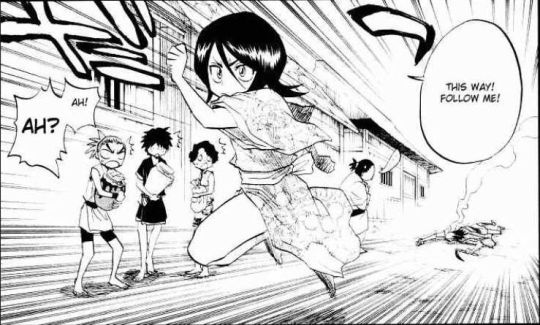
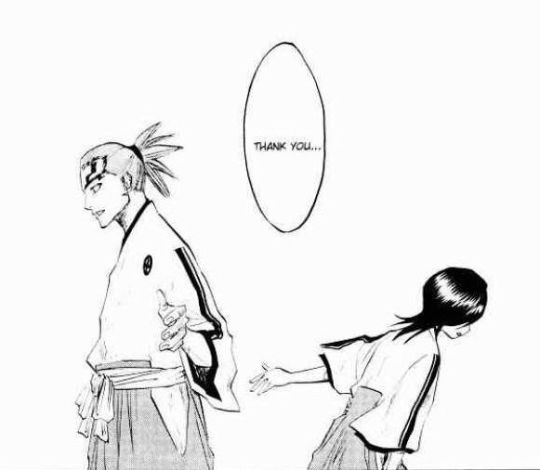
Indeed, Renji Abarai's love for Rukia Kuchiki dates back to their childhood in the Rukongai district. Despite the disparities in their backgrounds, Renji consistently treated Rukia with respect and kindness. While Renji and Rukia share a deep history as childhood friends from the Rukongai district, their lives took different paths when Rukia was adopted into the noble Kuchiki family. This social and power disparity, along with the rigid rules of the Soul Society, influenced Renji's interactions with Rukia.
As the series progresses, the layers of their relationship are explored, revealing the depth of their bond and the struggles they face due to their pasts.
Introduction

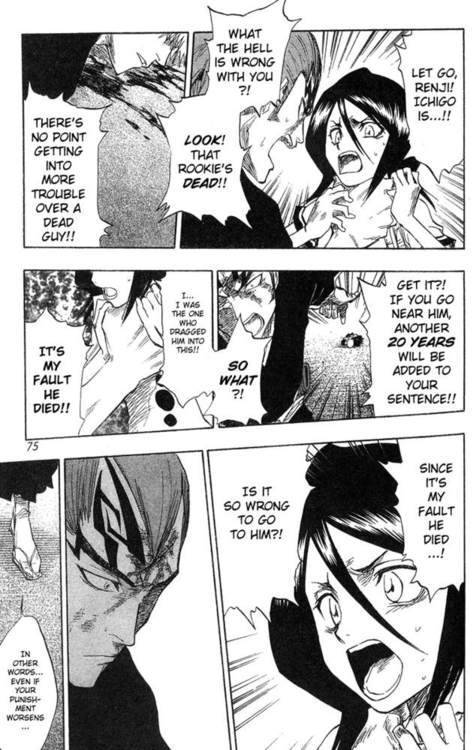
Abarai's initially antagonistic appearance in his debut in Bleach, when he attempted to bring Rukia back to the Soul Society, can be attributed to the hierarchical structure and rigid rules within the Soul Society.
At that point in the story, Renji held the position of 6th Seat in the 6th Division under Captain Byakuya Kuchiki. This mission not only introduces the hierarchy and rules of the Soul Society but also reveals the strained dynamics within Rukia and Renji's friendship. Ichigo's intervention in an attempt to save Rukia leads to a brief but intense fight with Renji. Ichigo's unexpected burst of reiatsu, fueled by his resolve, highlights the depth of his determination. Byakuya's subsequent involvement showcases the vast power of the Kuchiki clan.
Renji's periodic visits to Rukia's prison, despite her impending execution, demonstrate his unwavering loyalty and care for her well-being. The revelation of their childhood friendship adds emotional complexity to their connection. The strain in their relationship, caused by Rukia's adoption into the Kuchiki family, reveals Renji's personal struggle to rise to her new social standing and gain acknowledgment from Byakuya.
Misplaced Retribution
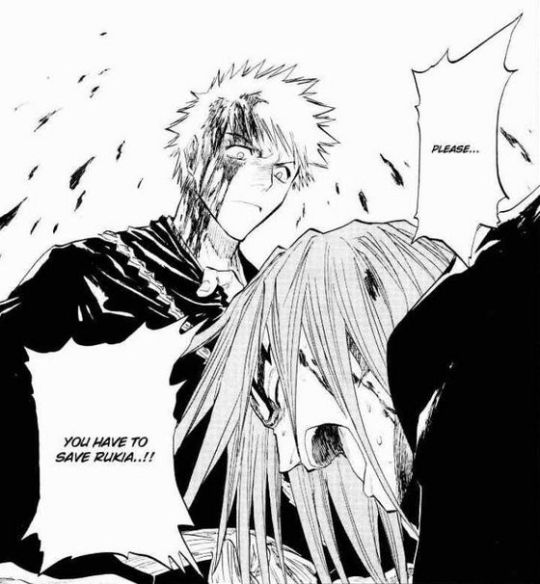
Renji's retribution during his second fight with Ichigo Kurosaki in Bleach reflects the complex emotions and internal conflicts he harbors. Blaming Ichigo for Rukia's impending execution becomes a way for Renji to deflect his own feelings of guilt and self-disappointment. His confession to Ichigo, where he admits to being envious of Ichigo's determination, unveils a deeper layer of Renji's character.
In reality, Renji grapples with regret for not having fought harder to protect Rukia when he had the chance. His self-hatred stems from this perceived failure to uphold his own principles and defend his friend.
Being Her Protector

Renji's act of protecting Rukia from Sosuke Aizen is a poignant moment that underscores the depth of his feelings for her. This scene occurs during the Soul Society arc when Aizen reveals his true intentions, and Renji intervenes to shield Rukia from harm.
Renji, at this point, is willing to defy the authority of Aizen, who holds a high position in the Soul Society, to protect Rukia. This showcases the strength of his commitment and the prioritization of Rukia's well-being. This scene contributes to the narrative's exploration of Renji and Rukia's relationship, showcasing Renji's devotion and his willingness to go to great lengths to keep her safe.
One-Sided Love?
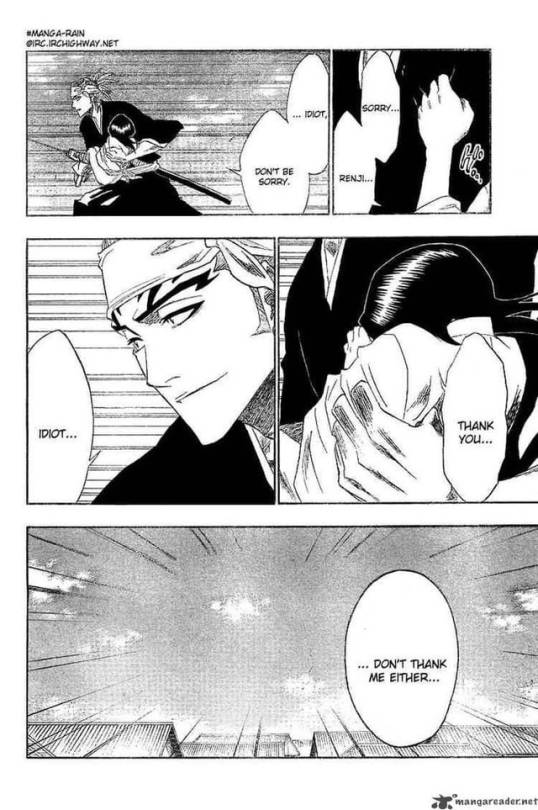

Throughout the story, Renji's love for Rukia is portrayed as a mutual and reciprocated relationship, revealing the depth of their connection. From their shared history as childhood friends in Rukongai to their intertwined destinies in the Soul Society, the narrative carefully unfolds the layers of their relationship.
Rukia's protective instincts and concern for Renji's well-being in certain situations indicate a depth of emotion beyond platonic friendship. Her reactions to Renji's battles and challenges suggest a personal investment in his safety and happiness.
Rukia displays emotional responses to Renji's actions and presence. Moments of blushing, especially in the manga, suggest a deeper emotional connection on her part. He consistently makes significant sacrifices for Rukia, demonstrating the intensity of his feelings. Rukia acknowledges and appreciates these sacrifices, indicating a mutual understanding.
Married Life
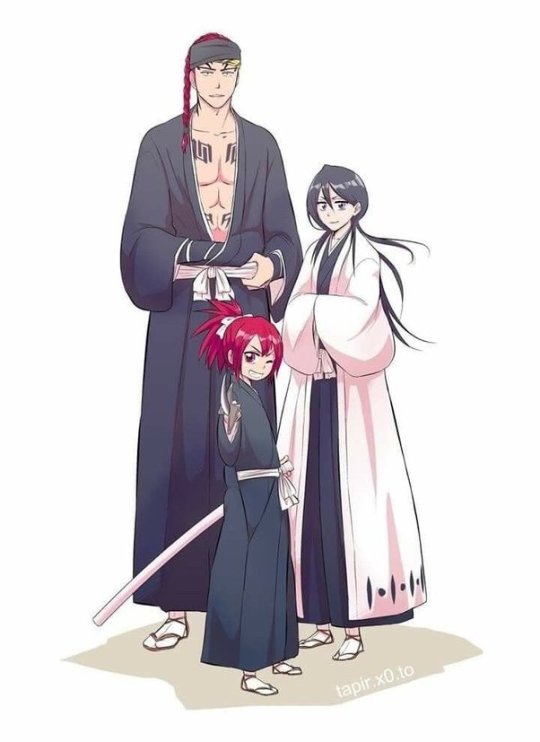
After the timeskip in the series, Rukia's interactions with Renji as a captain and their shared responsibilities provide glimpses into their evolving relationship. Absolutely, the final chapter of Bleach provides a significant culmination of Rukia and Renji's relationship. The revelation that they are married with a daughter named Ichika underscores the progression from childhood friends to a blossoming romance and eventually a family.
The issue of Renji not taking up Rukia's surname after they got together and had a child is actually pretty easy to explain... Rukia is the younger sister and prospect heiress of the leader of the family, Byakuya, who is still liable to get married and have kids since Soul Society nobles can have children. (It's even a plot point in the anime filler arcs). Were Renji to take up the Kuchiki surname, he and Rukia would unintentionally "create" a branch line of the Kuchiki clan, which could get incredibly messy if Byakuya ever sired an heir. By having Renji keep the Abarai surname and passing it to Ichika instead, they're saving themselves and Byakuya a lot of trouble.]
The choice to depict them as a married couple with a child serves as a poignant and conclusive moment, giving fans a glimpse into the characters' happily-ever-after.
#bleach ships#bleach#renji abarai#rukia kuchiki#bleach rukia#bleach renji#renji x rukia#renruki#shipping#relationship#childhood friends#romance#shounen#character analysis#anime and manga#tite kubo
44 notes
·
View notes
Text
Talking about my beloved Háma earlier this week got me thinking again about how Beregond is the Háma of Gondor. One of the ways Tolkien showed us how bound together Gondor and Rohan were as countries was by drawing explicit parallels between individual Gondorians and Rohirrim (like Boromir and Théodred), and it happens for everyone's favorite guards, too. They have some differences (I mean, Háma dies 😭), but they’re much more alike than not.
Most importantly, they’re both soldiers—part of a very hierarchical, duty-bound structure—who nonetheless decide in key moments to disregard orders and follow their own judgment and good sense instead. Háma will let Gandalf violate the ban on weapons in Meduseld and Beregond will leave his post and literally slay anyone facilitating the burning of Faramir because their hearts and minds tell them that sometimes laws must be broken in service of a larger morality. That takes courage, independence of thought, and a strong sense of self. By disobeying, they both knowingly risk punishment—and, indeed, both are punished—but they do it anyway because they know it’s right. And ultimately, both are forgiven and honored because everyone can see they made correct, if unlawful, decisions. (This parallel is also replicated a little further up the respective hierarchies because Éomer and Faramir are also both noted mavericks who choose at pivotal moments to aid members of the Fellowship even though, by law, those outsiders should be arrested or killed. So, again, parallels between pairs of Gondorians and Rohirrim abound!)
I like that Tolkien takes care to show that it’s not just the folks at the very top of communities of Men that can have and display these really admirable and noble traits. It’s important for there to be a Háma and a Beregond so that we know these lands of Men are worth protecting—there is goodness there! And of course it fits very neatly with the “small hands do great deeds” theme of LOTR overall. Háma and Beregond each change the course of history when they trust to their own worth and hold to their own values, no matter the circumstances or consequences.
So that’s the biggest/weightiest parallel for Háma and Beregond, but it’s certainly not the only one. They both work for prestigious military units in the capital city of their countries. They both play formal roles in granting our major characters access to those cities. They’re both firsthand witnesses to the mental manipulation and torment of their leaders (Théoden and Denethor) by an enemy. They both get joyful moments witnessing the healing of a beloved lord. They’re both Gandalf enthusiasts in places where not everyone respects or welcomes Gandalf’s presence. They both demonstrate a willingness to draw swords on anyone they perceive as threatening their lords. They’re both pretty adept at rolling with it when things take a really weird turn (I mean, really, the legendary lost heir of Elendil shows up on Háma’s doorstep claiming to be friends with a mythical elf-sorceress, and he just goes with it. And Beregond has never seen a hobbit before and maybe isn’t even sure they’re real when one is thrust on him, and he immediately makes Pip his buddy!).
Those are the canon parallels, but I would be remiss if I didn’t finish by specifying that @brigwife and I agree it is rock solid head canon that Háma and Beregond met somehow and became actual long distance best friends. It’s only natural that they’d get along given how much they have in common—just two absolute gems of the race of Men who would totally love and appreciate one another. And I’d like to think that even as Háma’s legacy is commemorated at his resting place in Rohan, there’s also a little memorial for him in Gondor built by Beregond in a beautiful, peaceful part of Ithilien. During Beregond’s lifetime it stands as a tribute to his enduring friendship with Háma, and in later days, when anyone who knew them is gone, it stands instead as a tribute to the enduring friendship of Gondor and Rohan.
#lotr#lord of the rings#tolkien#rohan#gondor#háma#hama#beregond#guards and brothers#rulebreakers and freethinkers#if you know anything about how i feel about háma#you know what a compliment this comparison is to beregond
36 notes
·
View notes
Note




Personally I see Ozai as a quiet kid for the most part. It's when someone touches him/pisses him off the inner menace shows up like Jeong finds out in my comic above.
Ozai was probably a quiet, cold, aloof, and callous child, especially during his teenage years, however, despite the hilariousness of this comic. I doubt an elite noble general or admiral would touch the Fire Prince of the Fire Nation without his direct approval and consent. Family members would be the exception and normal occurrence. However, it would be taboo and horrible manners for someone random to touch nobility, especially royals without approval. Even a general or admiral would probably have a finger or hand cut off for such an offense in a hierarchical-dominated society like in Fire Nation Elite Culture. Iroh and Azulon on the other hand would have no issue touching Ozai even Li and Lo; if they were Azulon's twin sisters. My headcanon is that Jeong Jeong is Li's son and Zhao is Lo's son. If that is the case then contact with Ozai would be permitted. Though I doubt Jeong Jeong would be touch-feely with Prince Ozai anyway even if he was his cousin. JJ was probably a bit strict, stern, and professionally aloof man even during the days of his military career as an Admiral and General though it got worse in the later years.
P.S. Also, Ozai as a prince and being raised by strict Azulon probably wouldn't attack Jeong Jeong outright but give him a strong and stern refusal of physical contact and respect for his personal space.
Jeong Jeong tries to pat Ozai's head and give him a hug…
Ozai: I would rather not...
Jeong Jeong: Very well, my prince…
#azulon#li and lo#iroh#ozai#jeong jeong#zhao#fire nation royal family#fire nation society#fire nation culture#fire nation imperial culture and norms#fire nation elites
25 notes
·
View notes